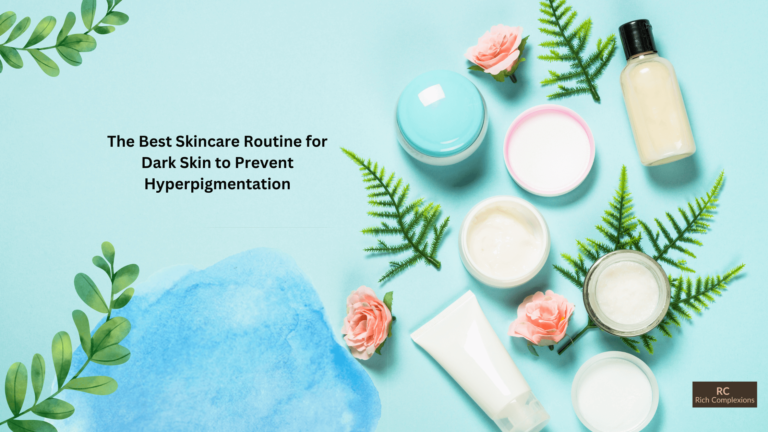Are you frustrated with stubborn dark spots and uneven skin tone that seem impossible to get rid of? Hyperpigmentation is a common concern for those with dark skin tones, and without the right skincare routine, it can become a persistent and frustrating problem.
Imagine waking up to a face that doesn’t reflect the radiant, even-toned skin you deserve. Constantly covering dark spots with makeup or feeling self-conscious in your skin can affect your confidence and prevent you from embracing your natural beauty.
The good news is that the right skincare routine can help you prevent hyperpigmentation and achieve the clear, glowing complexion you desire. By understanding your skin’s unique needs and using targeted products, such as EXTRASHADE sunscreen, you can protect, nourish, and enhance your skin, revealing its true, beautiful tone.
Let’s dive into the best routine tailored specifically for dark skin to keep hyperpigmentation at bay.
What Is Hyperpigmentation?
Hyperpigmentation is a common skin condition characterized by the darkening of certain areas of the skin. This darkening occurs when there is an excess production of melanin, the pigment responsible for skin color. The condition can affect people of all skin tones and usually appears as dark patches or spots that are more noticeable than the surrounding skin.
Causes of hyperpigmentation
Hyperpigmentation can be triggered by several factors, including:
- Sun Exposure: Ultraviolet (UV) rays from the sun can increase melanin production, leading to dark spots, especially on areas frequently exposed, like the face, hands, and arms.
- Inflammation or Skin Injury: Post-inflammatory hyperpigmentation can occur after skin injuries, acne, eczema, or other skin conditions that cause inflammation. The skin produces more melanin as it heals, leaving dark spots or patches.
- Hormonal Changes: Conditions like melasma, often seen in pregnant women or those taking birth control pills, are linked to hormonal changes that increase melanin production.
- Medications: Certain medications, such as chemotherapy drugs or some antibiotics, can cause hyperpigmentation as a side effect.
- Medical Conditions: Some underlying health issues, like Addison’s disease or hemochromatosis, may lead to hyperpigmentation.
Types of hyperpigmentation
- Melasma: Often appears as large patches on the face, typically due to hormonal changes or sun exposure.
- Sunspots: Also known as age spots or liver spots, these small, darkened patches are caused by prolonged sun exposure.
- Post-Inflammatory Hyperpigmentation (PIH): Develops following an injury or inflammation, like acne or eczema, and can appear anywhere on the body.
Best Skincare Routine for Dark Skin to Prevent Hyperpigmentation
Hyperpigmentation is common in darker skin tones due to higher melanin levels. A tailored skincare routine can help prevent and reduce dark spots, uneven skin tone, and hyperpigmentation. Here’s a comprehensive skincare routine to help you maintain healthy, even-toned skin:
1. Cleanse gently
Use a gentle, sulfate-free cleanser to remove dirt, oil, and makeup without stripping the skin of its natural moisture. Look for cleansers with ingredients like glycerin or hyaluronic acid to maintain hydration.
2. Exfoliate regularly
Regular exfoliation helps remove dead skin cells that can make hyperpigmentation appear more pronounced. Opt for a mild exfoliant containing alpha-hydroxy acids (AHAs) or beta-hydroxy acids (BHAs), such as glycolic acid or salicylic acid, to promote skin renewal and prevent clogged pores. Exfoliate 2-3 times a week, depending on your skin’s sensitivity.
3. Use a brightening serum
Incorporate a serum containing ingredients like vitamin C, niacinamide, licorice extract, or tranexamic acid to help fade dark spots and even out skin tone. These ingredients work by inhibiting melanin production and reducing the appearance of hyperpigmentation over time.
4. Moisturize daily
Keep your skin hydrated with a moisturizer suitable for your skin type. Look for a product containing ceramides, hyaluronic acid, or glycerin to strengthen the skin barrier and retain moisture. For oily or acne-prone skin, use a lightweight, non-comedogenic moisturizer.
5. Apply sunscreen every morning
Sun protection is essential in preventing hyperpigmentation. Use a broad-spectrum sunscreen with SPF 30 or higher daily, even on cloudy days or indoors. EXTRASHADE Sunscreen is specially formulated for darker skin tones, providing effective protection without leaving a white cast. Reapply every two hours when outdoors or exposed to sunlight.
6. Incorporate retinoids at night
Retinoids (like retinol or prescription-strength retinoic acid) accelerate cell turnover, helping to fade dark spots and improve skin texture. Start with a lower concentration and gradually increase usage to avoid irritation. Use retinoids at night, as they can make your skin more sensitive to the sun.
7. Address inflammation
Inflammation can exacerbate hyperpigmentation. Look for skincare products with anti-inflammatory ingredients, such as green tea extract, niacinamide, or aloe vera, to calm and soothe the skin.
8. Avoid picking or scratching
Picking at acne or other blemishes can lead to post-inflammatory hyperpigmentation (PIH). Keep your hands away from your face and treat acne promptly with gentle, non-irritating products.
Conclusion
A consistent skincare routine with gentle cleansing, regular exfoliation, brightening ingredients, and sun protection can effectively prevent and reduce hyperpigmentation in dark skin. Using products formulated for darker skin tones, such as EXTRASHADE Sunscreen, ensures optimal protection and care.
Remember that patience and consistency are key, as it may take time to see significant improvement.

